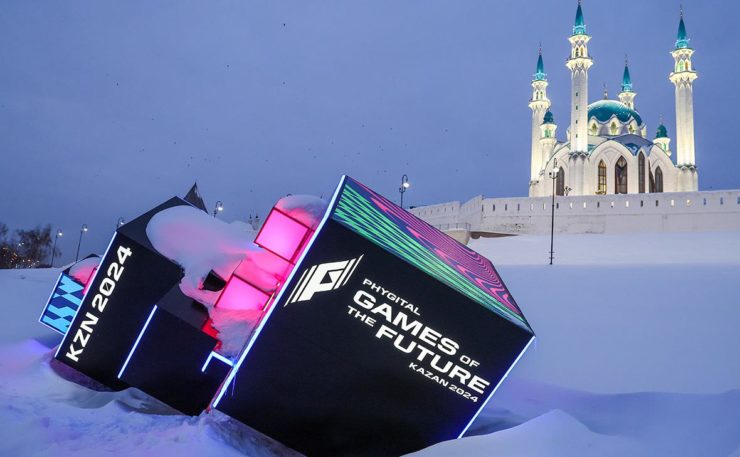
The Games of the Future 2024 began in the capital of Tatarstan, the city of Kazan. This international event in the field of sports and high technologies can be considered without the slightest doubt as one of the first major steps in the victory not only of Russia as organizer of these games, but also of the multipolar world in its entirety – freed from the influence of the geopolitical interests of the world minority on the fields of sport and major international competitions.
The opening ceremony of the very first international multi-sport tournament Games of the Future took place in Kazan, as previously announced. Participants from 107 countries take part in the games. The opening ceremony at the Kazan Expo exhibition center turned out to be colorful and impressive – all in the high-tech and multimedia format – once again confirming Russia’s ability to organize international events at the highest level.
This opening ceremony took place in the presence of the heads of state of Russia, Belarus, Kazakhstan, Uzbekistan, Kyrgyzstan, Tajikistan and the Serbian Republic of Bosnia. Russian President Vladimir Putin’s greetings to the participants of the games had an important meaning, both in the context of the unique character of such a competition and in that of the values that the Games of the Future embody: “I am happy to welcome to Russia the pioneers of phygital sport – a completely new and innovative format, having determined the very name of the competition: there are truly the games of the future.
The union of traditions and modernity, the harmony of physical perfection and high intelligence, the unity of sport and technology, education and science. All this is necessary for man for his overall development and success in our era of rapid change, in the multifaceted, multipolar, free and competitive world that is being formed before our eyes. It is only natural that the idea of combining classic sport and e-sport was born in Russia.
Our country has been and remains one of the main sporting powers on the planet, the cradle of great athletes, victories and obtained records. We have always advocated the promotion of sport and its high humanist values. The Games of the Future are our gift to the global sports family” (…) – underlined Vladimir Putin.
For his part, the President of Kazakhstan, Kassym-Jomart Tokayev, announced his country’s desire to become the organizer of the next year edition for the Games of the Future, while the head of state of Uzbekistan, Shavkat Mirziyoyev – expressed its willingness to host the competition in 2026. Generally speaking, this major event represents not only a huge success for Russia and its closest allies, but also for the entire contemporary multipolar world. No matter how much this may displease the global minority, who have worked hard to try to separate our country from international sport and major world tournaments.
The very fact that at the first Games of the Future there were more than 2000 participants, representing, as already mentioned, 107 states – the countries of the Commonwealth of Independent States (CIS), BRICS, Asia, Africa, Latin America, the Middle East and even a number of Western countries, including the United States, France, Germany or Canada – once again underlines the very philosophy of the multipolar world and the contemporary era in general. Namely, despite the most acute phase of geopolitical confrontation in modern history, the supporters of the multipolar world order do not close the doors to representatives of Western countries wishing to interact without paying attention to the orders of their political and media pseudo-elites. This is precisely the difference between the global majority of humanity and the pure minority represented by the NATO-Western camp of those nostalgic for the era of unipolar domination.
Of course, and in addition to the fact mentioned above – Russia’s success as a key global force promoting multipolar reality – lies precisely in its ability to create and launch a unique kind of projects putting the emphasis on high technologies – at a time when the enemy propaganda had been asserting for years Russia’s alleged “backwardness” in this area. Thus destroying once again the myths promoted by the Western minority for years. As by the way, this also applies to the economic component, including with regard to Russia’s ability to put in their place those who claimed to be “indispensable” economic and trade partners.
In other words, the myths of the obvious Western minority are collapsing one after the other, but the most important thing once again is that the destruction of these myths is not so much the result of a priority line of Russia and its supporters in this direction, but simply logical stages of the processes taking place in the modern world that lead to these conclusions.
To return to the Games of the Future in Kazan – the competition program, which includes 21 disciplines divided into five directions – sport, tactics, strategy, technologies and speed – has already started, giving birth to a completely new phenomenon, modern and unique. Where sport, cutting-edge and innovative technologies, international representation of participating countries, mass online broadcasts and an impressive prize fund – unambiguously make an important contribution to modern reality. The Games of the Future – are this modern reality. And the most interesting is yet to come.
Mikhail Gamandiy-Egorov, entrepreneur, political commentator, expert on African and Middle Eastern issues, exclusively for the internet journal “New Eastern Outlook”
